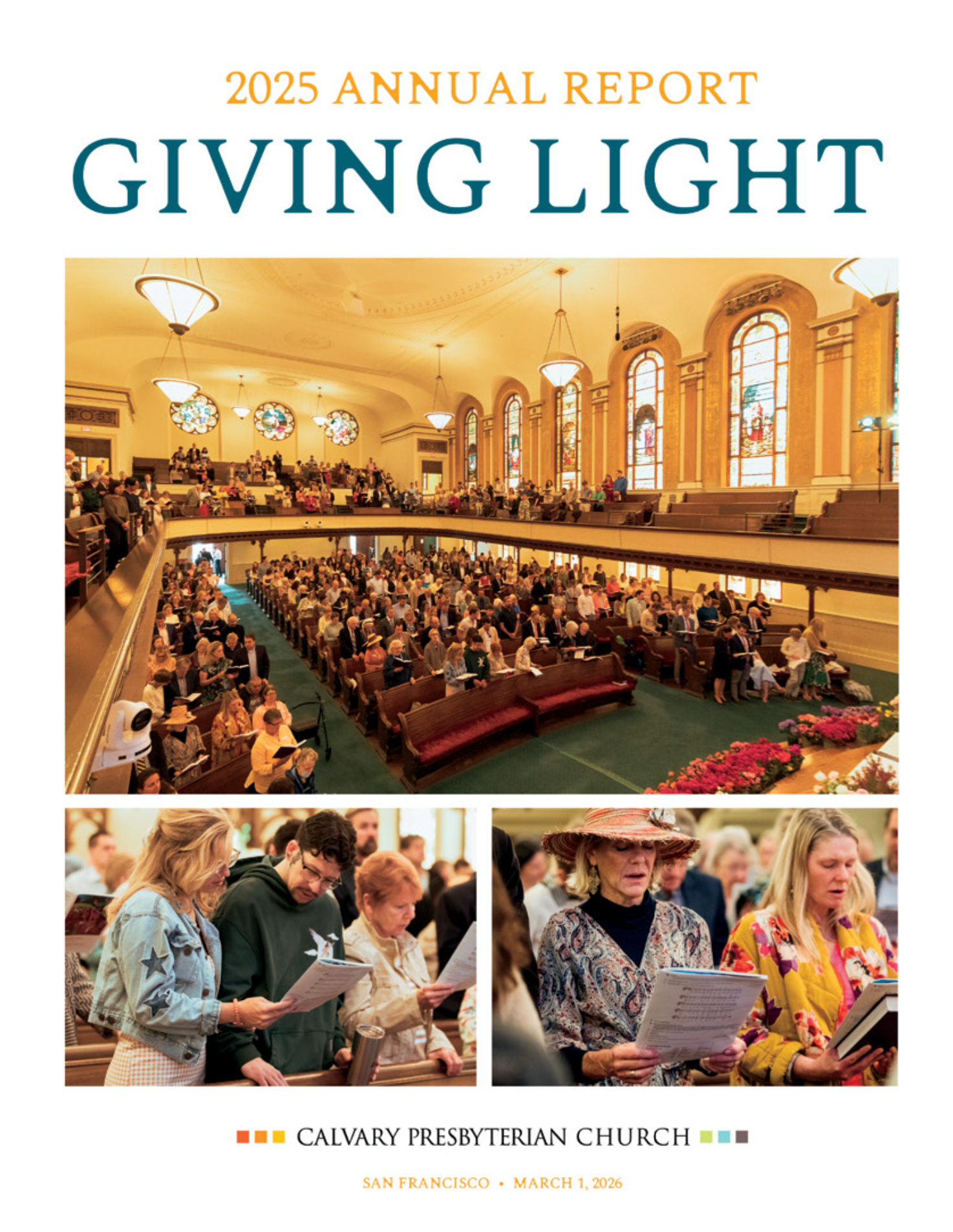Sermon 12.15.2024: A Weary World Rejoices
Our theme for this Advent season is “Longing for Light.” We long for light because we are weary and tired of the long nights and brutally short days. So how does a weary world rejoice? Can we experience joy in the midst of all that is happening in the world and in our lives? The poet Toi Derricotte writes, “Joy is an act of resistance.” So joy is not frivolous; it is necessary. Let us find joy together in community as we await the birth of Christ.
Scripture
Isaiah 25:1-9
O Lord, you are my God;
I will exalt you, I will praise your name; for you have done wonderful things,
plans formed of old, faithful and sure.
For you have made the city a heap,
the fortified city a ruin; the palace of aliens is a city no more,
it will never be rebuilt.
Therefore strong peoples will glorify you;
cities of ruthless nations will fear you. For you have been a refuge to the poor,
a refuge to the needy in their distress,
a shelter from the rainstorm and a shade from the heat. When the blast of the ruthless was like a winter rainstorm,
the noise of aliens like heat in a dry place, you subdued the heat with the shade of clouds;
the song of the ruthless was stilled.
On this mountain the Lord of hosts will make for all peoples
a feast of rich food, a feast of well-matured wines, of rich food filled with marrow, of well-matured wines strained clear. And he will destroy on this mountain
the shroud that is cast over all peoples,
the sheet that is spread over all nations; he will swallow up death for ever. Then the Lord God will wipe away the tears from all faces,
and the disgrace of his people he will take away from all the earth,
for the Lord has spoken. It will be said on that day,
Lo, this is our God; we have waited for him, so that he might save us.
This is the Lord for whom we have waited;
let us be glad and rejoice in his salvation.
Sermon
THIS ADVENT SEASON, WE HAVE BEEN PREACHING FROM THE BOOK OF ISAIAH. Marci has given us some context for this prophetic work, which was written during a large span of Israelite history as outside forces subjugated and ruled over them.
This means that there is historical context for which these words were written. Something specifically happened to spark Isaiah’s oracles and prophesies. But chapters 24 through 27 elude this specificity. In fact, today’s scripture, Chapter 25 is more like a psalm, praising God for saving the weak by sending judgment on the mighty oppressors.
These four chapters are often referred to as “Isaiah Apocalypse” because they are marked by a heavy dependence on the motifs often used by those writing apocalyptic literature, like Daniel and the book of Revelation.
It is actually quite difficult to root this chapter in any historical context. But what we do know is this: Israel was a small nation-state surrounded by larger, stronger, and mightier empires.
They were often the underdog and subject to the whims and caprices of other nations. So the threat of the “palace of aliens” referred to in verse 2 and “ruthless nations” in verse 3 was real. Outside forces taking over and destroying life as they knew it was not only possible, it happened.
But still, even in the midst of real fear and danger, the prophet Isaiah is able to dream of a world where God will “wipe away the tears from all faces,” and we can “be glad and rejoice.”
Joy in this season seems to be an expectation. Christmas songs insist that this is the “most wonderful time of the year,” the “hap-happiest season of all.” But is it, really?
I follow an Instagram account called “disappointing affirmations,” which is meant to be satirical and funny. And one of their recent posts said, “It’s okay to be sad. Just remember to pretend that you’re not. For others.”
And I laughed out loud because we all know it shouldn’t have to be true. And yet, there is this underlying agreement in society that we will all uphold this. We will pretend that we’re okay. We will show only our best selves. We will pull it together.
But joy, real joy, isn’t born of pretense. It isn’t a surface-level feeling. The kind of joy that our scripture talks about is more than just circumstantial or a fleeting feeling. Perhaps we would call that feeling “happiness.”
But the joy found in the Bible is more than that. It is a way of being in the world, a theological disposition that defies the powers of death and destruction.
And it is commitment, a choice we make, not in spite of all that is painful and broken in the world, but born with new life from it. Barbara Brown Taylor reminds us,“...new life starts in the dark. Whether it is a seed in the ground, a baby in the womb, or Jesus in the tomb, [new life] starts in the dark.”
So our joy is rooted in the beauty and mystery of darkness, as we stretch and hope and long for light.
If Isaiah could proclaim joy, in the midst of all his people experienced, then, perhaps, we, too, can proclaim joy.
Afterall, Toi Derricotte reminds us, that joy has implications we may not even consider. Because our joy is not just for us. “Joy is an act of resistance,” she writes.
Let me say that again, “Joy is an act of resistance,” a way we say “no” to the powers that be, a way we resist hatred and meanness and supremacy in all its forms. Your joy, our ability to rejoice, is an act of resistance.
If we can still laugh at ourselves and with one another, the powers and principalities that seek to demean and dehumanize have not won.
If we can smile at a toddler dancing to A Charlie Brown Christmas, allowing our hearts to warm, the powers and principalities that seek to demean and dehumanize have not won.
If we can sing portions of Handel’s Messiah, allowing our voices to rise with others and our hearts to swell with hope, the powers and principalities that seek to demean and dehumanize have not won.
Joy is not frivolous; it is necessary.
Cole Arthur Riley, author of Black Liturgies says this of joy: “We must reclaim joy outside of the artificial ‘cheer’ it is often reduced to. There is a joy that is defiant. A portal to survival for our ancestors. A way to say, we will not be captive to despair nor abandon our belief in beauty. Joy with teeth. Never complacent, always ready.”
Friends, that’s what we mean by joy is resistance.
So when is the last time you felt unabandoned joy? Think about that for a second. Maybe it’s been a while.
And I say unabandoned, because in its original Hebrew, the root of the word rejoice doesn’t just mean “to be glad and to exult,” but it also means to spin in circles, as in, you are so ecstatic, that you spin with joy. Imagine a child entering a winter wonderland and spinning with glee. There is a freedom and a sincerity in this joy.
I know that I personally like to hedge my joy. I’m a pessimist by design, so when I feel exuberance bubbling up, I often remind myself, “well, this could all fall apart and probably will.” And, to be frank, in my life, and likely yours, too, there have been examples of this being exactly the case, proving that we were right to be suspicious all along.
Most of us feel vulnerability – or even fear – when confronted with the possibility of joy. Brené Brown illuminates this paradox in her prolific writings. She observes that:
If you’re afraid to lean into good news, wonderful moments, and joy – if you find yourself waiting for the other shoe to drop – you are not alone. It’s called “foreboding joy,” and most of us experience it. (Atlas of the Heart, 2021).
According to Brown, joy frightens us because it reminds us of what we have to lose. Joy floods and fills us when we feel deeply connected to the people, places, and experiences we value most. At the same time, joy carries an undercurrent of vulnerability that threatens our ability to soak up its benefits, because, did you know, resilience, strength, and courage flow from joy when we let them?
In her own words, Brene Brown asserts that:
In the midst of joy, there’s often a quiver, a shudder of vulnerability. Rather than using that as a warning sign to practice imagining the worst-case scenarios, the people who lean into joy use the quiver as a reminder to practice gratitude.
Gratitude, like hope and love, is a verb, and it is a muscle. When we practice gratitude, our capacity to feel it grows. And joy and gratitude build each other up. [1]
So what are you grateful for today? And how will you cultivate joy, knowing that it is part of the resistance?
I’ve been looking up ways to hack our brain chemistry because scientists say that that’s what it all boils down to: The ability to make and maintain dopamine, serotonin, oxytocin, and endorphins. And if you can’t make it yourself, storebought is okay. I’m a true believer in that whether it be meals or neurotransmitter; storebought is okay.
But before we knew all this science, perhaps our spiritual ancestors knew something about joy, too.
Today’s scripture reminds us that according to Isaiah, we rejoice because God is a refuge to the poor and to the needy in their distress.
We rejoice because God is a shelter from the rainstorm and a shade from the heat.
We rejoice because all peoples will feast on rich food and good, matured wines.
In other words, joy comes when all are sheltered, all have enough to eat, and those who are the most vulnerable in our society are cared for.
So, as we move through this holiday season into a new year, let us practice embracing joy. Not just for ourselves, but for the world.
For the sake of joy, we will advocate for more affordable housing, and we will seek ways to reduce homelessness in our city and communities.
For the sake of joy, we will continue to make lunches through pack-a-sack and feed those who are hungry. We will volunteer with the Interfaith Winter Shelter dinners.
We will advocate for just food prices, and for the end of food deserts.
For the sake of joy, we will walk with immigrants and refugees seeking asylum and safety here in the United States.
Last week, we got to witness one family’s joy as they were granted asylum with God’s help and the help of God’s people, many of you. Allow yourself to rejoice with them and hold onto that joy.
For in Advent, we proclaim that this is the Lord for whom we have waited; so let us be glad and rejoice.
Thanks be to God. Amen.
1 https://heartmindonline.org/resources/3-ways-to-boost-gratitude-and-unleash-your-joy-with-bren%C3%A9-browns-atlas-of-the-heart











